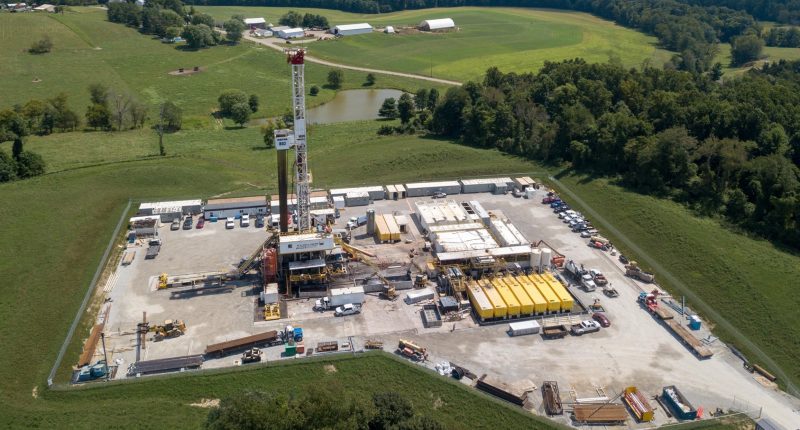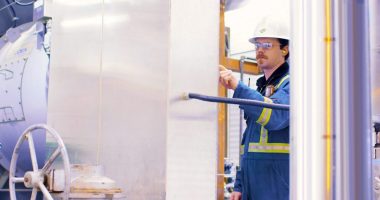Despite momentum in green energy development, oil demand is expected to rise through this decade and remain high well into the 2040s, meaning that an investment lifetime remains to capitalize on undervalued oil stocks.
Given the cyclicality and volatile nature of the oil industry, every once in a while a candidate for due diligence can see its stock price knocked blatantly below intrinsic value, such that it befuddles the mind how the market could be missing such a substantial discount.
Look no further, dear prospective investor, than AKITA Drilling (TSX:AKT.A), an intermediate North American land drilling contractor active in major resource basins in Canada and the United States, where it is generating consistent profits at the beginning of oil demand’s expected upswing through 2030.
Despite this profitability, which we’ll detail after introducing AKITA’s business model, and robust deal flow supported by oil’s ongoing rise from a COVID-low of US$40.83 per barrel in April 2020 to US$78.66 per barrel as of Feb. 22, 2024, the estimated value of AKITA’s 32 drilling rigs is about 8x its market capitalization of C$57.98 million as of Feb. 22. 2024. The company traded at an EV/EBITDA ratio of just over 2 in Q2 2023 (slide 10), which is 3-4 times less than comparable oil and gas multiples and the average across industry leaders. The industry average for the multiple surpassed pre-pandemic levels in Q4 2022 and has only continued to rise. They say there are no free lunches in the stock market – and given the future’s inherent unpredictability, that is probably always true – but such extreme price-value dislocations are the closest any investor can hope to get.
AKITA’s value proposition is reinforced by a management team made up of commodity cycle veterans, whose long tenures and decades of progressive experience grant it the perspective to optimize drilling operations regardless of market conditions.
Management’s nimbleness was most recently on display during COVID, which resulted in severely reduced day rates as WTI fell by almost 70 per cent from January to April 2020. The company laid low until reopenings became more widespread thanks to swift vaccination development, and rig demand began a sustained rise starting in Q3 2021. This prompted management to secure C$20 million in strategic debt to reactivate rigs and prepare for the expected strong years ahead, as the global population reacquainted itself with the world outside their homes.
The move has paid off, with AKITA stock gaining more than 440 per cent from its COVID low of C$0.27 in May 2020 to C$1.46 as of Feb. 22, 2024, including five consecutive quarters of positive earnings as of Q3 2023, backed by a technologically advanced drill fleet creating value across shale, tight sands, heavy oil and oil sands, as well as wells for the agriculture and green energy sectors.
A venerable fleet
Across its more than 30-year history as a public company since 1993, AKITA Drilling has created a tight-knit, values-based culture across more than 700 oil industry professionals, each of them committed to the deployment of 32 drill rigs acquired to maximize client and shareholder returns while minimizing environmental impact.
A total of 23 rigs have the ability to drill pads, which contain wellheads for numerous horizontally drilled wells from one location, as these rigs have specialized moving systems. These allow operators to move a fully constructed rig from one well to the next through hydraulic walking or skidding in less time, at lower cost, and with a smaller emissions footprint, compared with disassembling and transporting a conventional rig.
Pad technology is especially useful for clients in seasonal climates, as they enable continued productivity through spring break-up, when the oil industry, particularly in Western Canada, tends to slow because of melting snow, soft ground, and the difficulties these present for moving heavy machinery in remote areas.
Besides the efficiency of drill pads, the company’s fleet is further equipped to minimize emissions with 25 rigs capable of running on highline electricity. This means they can source power from a utility provider, virtually eliminating drilling emissions compared with diesel generators, and nine rigs capable of running on bi-fuel, a blend of low-carbon natural gas and diesel that minimizes diesel fuel consumption.
AKITA’s customers speak to the quality and sophistication of its operation, including current work with Cenovus, CNRL and Shell in Canada, Occidental Petroleum in the United States, and past projects with the likes of Exxon and EOG Resources.
Canadian fleet
AKITA’s Canadian operations include 17 rigs focused primarily on heavy oil and oil sands plays, with increasing diversification into natural gas, as well as geothermal energy, carbon capture, potash and hydrogen storage. Ten of AKITA’s Canadian rig fleet were active at the beginning of Q1 2024.
Canadian heavy crude oil, highlighted by Alberta’s oil sands, the largest crude oil deposit in the world, provides millions of barrels of oil per day for plastics, petrochemicals, transportation fuels and road surfacing, among many other applications. Canadian heavy crude benefits from rising demand from U.S. refineries, which are hampered by a domestic supply of mostly light crude, as well as Chinese refineries looking to satiate the country’s population of more than 1.4 billion people, not to mention Canadian refineries from coast to coast.
The Trans Mountain Pipeline Expansion Project is slated to fortify pipeline capacity from Alberta to the British Columbia coast by up to 890,000 barrels per day (bpd) beginning with a ramp up from 300,000 bpd in Q2 2024. AKITA’s rigs in Alberta, Saskatchewan and B.C. are likely to benefit from increased revenue as Canadian operators sell their products at more favorable prices overseas thanks to the pipeline’s greater efficiencies compared with selling in the U.S. Midwest, and its differentiated position as North America’s only pipeline with access to the West Coast.
These tailwinds are enhanced by the fleet’s specifications, which are curated to optimize performance in their target markets:
- Nine of the 17 rigs are deep triples, which facilitate high-efficiency and high-capacity exploration, and represent the highest percentage of triple rigs on offer by any Canadian public driller. Commenting on AKITA’s strategic fleet during a recent interview with Stockhouse, Colin Dease, AKITA’s President and Chief Executive Officer, noted that “people are calling for industry consolidation in the oversupplied tele-double drilling rig market, which represents the bulk of many of our competitors’ fleets. In AKITA’s case, however, our fleet primarily consists of triples, which are scarcer in the market.”
- 30 per cent of the active Canadian fleet ran on highline electrification over Q1 2023.
- 17 per cent of the active fleet ran on bi-fuel.
But best of all, from a value investing perspective, it would cost a driller C$120 million to replicate the company’s Canadian fleet, amounting to more than double its market capitalization, and that’s only half the story.
U.S. fleet
AKITA’s U.S. fleet is now concentrated in the Permian Basin, which accounts for almost 40 per cent of U.S. oil production and nearly 15 per cent of natural gas production. About half of U.S. rig activity took place in the Permian over the first half of 2023, extracting more than 5 million barrels of oil per day, according to the Federal Reserve Bank of Dallas, with tens of billions of barrels in recoverable oil to be exploited. AKITA had ten rigs active at the end of Q4 2023, with management expecting a rebound by the second quarter in 2024.
Almost 90 per cent of the U.S. fleet is made up of high-spec 1,500 HP or greater AC triple rigs with 7,500 psi circulating systems. High-spec rigs achieve higher utilization, even during a recession, thanks to their ability to reach into deep, complex geologies, and maximize production during year-round drilling schedules, such as the Permian’s.
Managed from an operational base in Midland, Texas, one of the top-producing counties in the state, the rigs are similarly equipped to minimize energy use and carbon emissions, with 21 per cent running on highline electricity and 14 per cent on bi-fuel in Q1 2023, while also presenting prospective investors with a gift of a value thesis, as their estimated value of US$255 million is 5.9x the company’s market capitalization when converted to Canadian dollars.
AKITA’s potential for outsized returns because of undervaluation is enhanced by operations that have proven themselves out in the income statement.
The company’s net income increased to C$3.88 million in Q3 2023, up from C$2.66 million year-over-year, marking its fifth consecutive quarter of positive earnings. This streak includes steep rises in revenue and operating margin per day over the past six quarters (slide 5) thanks to growing demand for high-capacity rigs and some of the highest oil prices over the past 50 years.
“From our perspective, oil demand is increasing, but top-grade acreage is decreasing, meaning operators are having to increase efficiencies, faced with the need to drill more wells at lower yields,” Darcy Reynolds, AKITA’s Vice President of Finance and Chief Financial Officer, commented during the same interview as Dease. “This is why the industry is organically trending toward a busier time for service providers like AKITA.”
When it comes to allocating the capital it is now consistently generating, AKITA is focused on reducing debt to better withstand the next inevitable downturn, given the difficulty of making bargain acquisitions because of strong oil prices and rich multiples across the industry.
Total debt decreased to C$79.233 million at the end of Q3 2023 from C$94.436 million year-over-year, after paying down C$14 million in the first half of the year, with plans to further deleverage to C$50 million by the end of 2024, supposing a continuation of rosy market conditions. The company yielded more than C$31 million in free cash flow through Q1-Q3 2023.
“The economics of building new equipment, considering that a new estimated AC triple rig build costs in excess of US$40 million, and the economics of most mergers, unless they are distressed, simply aren’t sensible right now,” Reynolds said. “In my perspective, the optimal strategy is to build up capital and establish a position of strength in a strong market until undervalued targets present themselves. Until then, debt reduction makes more sense for AKITA to focus on.”
Dease said AKITA is also working on upgrading some existing Canadian assets for deep natural gas drilling, and playing a part in the growing market for liquid natural gas propelled by the fuel’s lower emissions profile compared with oil, and LNG Canada’s imminent production, which will add 14 million tonnes of capacity per year. To this end, AKITA high-graded one of its oil sands rigs in Q4 2023 to tailor it for drilling deep gas, which he believes will strengthen the company through diversification.
“Echoing Darcy’s point, the cost of a new rig has gone up so much, with day rates far from supporting new construction,” Dease said, “that we were able to convert the rig for deep gas for approximately one-tenth of the cost of a comparable new build, with the potential to convert two more over the next one to two years, enabled by the market’s increasing demand and premium rates for deep AC triple rigs.”
Underscoring AKITA’s focus on shareholder value generation, Reynolds further noted that becoming debt free would only be a viable pursuit in the absence of the more exciting opportunities a strong oil market can provide, including special dividends – AKITA paid a consistent dividend as high as C$0.36 per share per year from 1996 to 2019, speaking to management’s efficient capital generation – and the acquisition of smaller operators looking for exits at inexpensive multiples. AKITA’s capital ratio in 2024 will likely remain at its current configuration of 50 per cent capital and 50 per cent debt, he said, with new earnings set to progressively open the door to pursue significant upgrades. After recording only deficits since Q1 2021, AKITA posted a positive retained earnings balance of C$3.672 million in Q3 2023.
“And if another big downturn happens,” Reynolds concluded, “AKITA will ride it through on its front foot, with clear operational targets in mind informed by our strategic pivot during the pandemic. Our aim is to be able to not only withstand any downcycle, but to take advantage of it because that’s when bargains are had. We don’t see market weakness on the horizon, but we will be prepared for any eventuality.”
An experienced management team
AKITA’s cash generation and steep upswing in share price from its COVID low could not be achieved without a management team whose shareholder-aligned interests, specialized experience and long in-house track records work in unison to bolster the bottom line.
Dease has worked at AKITA for the past 14 years, having been appointed as President and Chief Executive Officer in April 2023, after serving as Chief Operating Officer and President of AKITA’s Canadian division. An experienced lawyer by profession, Dease is also Chairman of the CAOEC (Canadian Association of Energy Contractors) and holds the Governance Fellows Designation from the NACD (National Association of Corporate Directors) and the ICD Designation from the Institute of Corporate Directors.
Reynolds, who has also progressed through a 14-year tenure at AKITA, was appointed Vice President of Finance and Chief Financial Officer in March 2017. Prior to joining the company, he worked at a Big 4 accounting firm and obtained his chartered accountant designation, eventually becoming a member of the Chartered Professional Accountants of Alberta.
AKITA’s board of directors complements its senior executives with the foresight, resolve and value-conscious sensibility that only robust expertise can bring, including:
- Executive Chair Linda A. Southern-Heathcott, a founding Director of AKITA, relative of founder R.D. Southern, President and Chief Executive Officer of Spruce Meadows Ltd., Vice Chair of ATCO Ltd., Canadian Utilities Limited and CU Inc., and Chair of Sentgraf Enterprises, AKITA’s controlling shareholder at 15 per cent. Southern-Heathcott owns an additional 4.19 per cent of AKITA in her name.
- Nancy C. Southern, Chair and Chief Executive Officer of ATCO Ltd. and Canadian Utilities Limited., a founding Director at AKITA and Sentgraf Enterprises, relative of founder R.D. Southern, and a 2012 honorary Chief of the Kainai (Blood Tribe of Alberta) under the bestowed name of Aksistoowa’paakii, or Brave Woman.
- Charles Wilson, a Director since 2002, whose experience as President and Chief Executive Officer of Shell Canada from 1993 to 1999 has helped AKITA navigate through the recent turbulence initiated by an extended downturn, exacerbated by COVID-19, and on through to recovery.
- Rob Peabody, a 40-year veteran in oil, gas and chemicals who served as Chief Executive Officer of Husky Energy from 2016 until its acquisition by Cenovus in 2020. He previously built a successful senior leadership track record at BP across Canada, the U.S., Europe and Asia.
- Loraine M. Charlton, a Director since 2006, who brings more than three decades of experience in the oil and gas industry, including serving as Vice President and Chief Financial Officer of Lintus Resources.
- Douglas Dafoe, whose more than 30 years of experience in finance and operations is currently highlighted by his position as President and Chief Executive Officer of Ember Resources, a private company focused on natural gas exploration and production from coal bed methane in Alberta. Dafoe also co-founded and led Thunder Energy and served as the Chair of Xtreme Drilling until AKITA acquired it in 2018.
- Harry Wilmot, a Director since 2014, with 12 years of senior management experience in the energy services industry and 39 years of broad-based business experience.
- Harish Mohan, a Director since 2011, with 10 years of experience in the oil and gas industry in Canada and over 33 years of finance-related experience.
Having substantiated an investment in AKITA Drilling in terms of deep undervaluation, a long-term market tailwind, and a knowledgeable management team capable of maneuvering through volatility with a focus on cash generation, it is clear that we are dealing with a classic example of stock market inefficiency, whose extensive growth runway remains mostly untapped.
Longevity with a communal foundation
Founder and former chairman R.D. Southern, who was recognized as honourary Chief of Tsuu T’inna Nation and given the honourary name of Chief Sorrel Horse, built AKITA up through a focus on the core values of integrity, respect and commitment, and the company has continued to deliver on them by treating every project as a partnership, nurturing its diverse employees, and establishing joint ventures with the First Nations whose land it is developing. Twenty different Indigenous groups currently hold equity investments between 5-50 per cent across six rigs, with the first joint venture dating back to 1983.
When we combine the intangible value of AKITA’s humanist, service-oriented culture and seasoned executives, with the tangible value of its in-demand equipment and essential commodity, what results is a company positioned for a stock price re-rating. That is, once the market realizes its ability to form lasting, profitable relationships – with employees, stakeholders and customers alike – is likely to propel it far beyond a fair valuation.
With U.S. and Canadian inflation around 3 per cent and outside of restrictive territory, and the oil price barely budging in response, your window for capitalizing before that realization takes place might be shorter than you think.
Join the discussion: Find out what everybody’s saying about this undervalued oil stock on the AKITA Drilling Bullboard, and check out the rest of Stockhouse’s stock forums and message boards.
This is sponsored content issued on behalf of AKITA Drilling, please see full disclaimer here.






